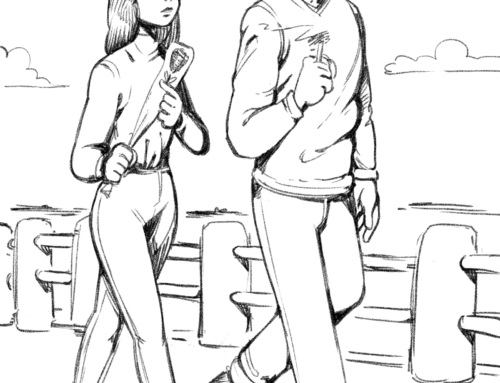“You’re Fired!”: Lutheran Hospital Edition
by Diane Pagen
Over the six or so weeks I worked on the Lutheran Hospital Psychiatry unit, our relationship grew more contentious. Nobody liked Eileen Klein. Not the patients and not the social workers. I couldn’t handle the volume, and neither could she, nor could anyone else. But I didn’t pretend I could. I asked for help. I put together a chart showing the limits of a fully scheduled social worker, so they could see I was working as much as a person could. Something needed to change.
My job at Universal Survey had been an awful job, so at first when I got to Lutheran’s psychiatry ward, I breathed easier. Instead of $7.25 an hour, I was making $25 an hour. The work was in my field. I love social work when not burned out. The trouble is that more often than ever, social work agencies don’t have any limits in place that prevent burnout. You grind and grind until it sets in.
Anyway, Eileen grew frustrated with my attempts to make changes to the extremely untenable workload—mostly just changes that allowed for more time to do the work. Hindsight is 20/20; in her defense, if I cared to defend her, I would say that mental health care in 2012 was already suffering from increases in financial cuts behind the scenes, off the wards, in the boardrooms where hospitals negotiated with Medicaid and Medicare for payment. No one on the wards knew, and I doubt supervisors were present at those private meetings. So Eileen Klein had no idea exactly what forces were moving the demands that we “finish” with patients and discharge them with a velocity that ignored what they really needed to get better. One day a few months later, in yet another psych ward, another social worker overhead a chief of staff who had returned from a big meeting say, “They said we are going to have to increase our tolerance for risky discharges.”
The chiefs of staff got leaned on downtown, they came back and leaned on the supervisors, and they leaned on us; and Eileen Klein, supervisor of social workers, leaned, and never fought back, never stuck up for her staff. The younger social workers—the ones just out of school—didn’t suggest there was something wrong. In appreciation for this she was generally nicer to those women than she was to me. About 8 years in social work had helped me start to see the pattern in my career, where conflict ultimately arose whenever I pointed out an unsustainable situation. For all the talk of helping people in social work, it’s rare to be appreciated for pointing out problems in the system, and it’s typical to be shunned or despised for designing and proposing a change.
For Eileen Klein to have appreciated someone else’s suggestions and proposals, and to have suggested we try them, would have been to admit that for a long time they’d been using a process that did not work. None of the psychiatrists had any interest in being shown up by social workers. On a daily basis, it was difficult to get one of the psychiatrists to even say hello to you. One or two were perpetually grumpy, like Dr. Inna. I couldn’t blame them once I found out that the ones from the former Soviet Union had had to repeat medical school in its entirety in order to get licensed here. That would make anyone a real grumpard. I imagine that my requests to give us more flexible deadlines to finish our work could be seen as frivolous by a person who’d had to repeat medical school on a technicality.
Consequently, despite my being professional in my requests, and despite several social workers agreeing with my criticisms, I was cooking my own goose and didn’t know it. At the end of six weeks, I was “fired.” The way it happened is worth the story; Eileen Klein in my view, violated the social work code of ethics for the way she handled it:
The B9 bus was never crowded on the morning commute from Bensonhurst to Sunset Park. An intra-borough commute is bucolic compared with the tension, noise and crowds you get fighting your way into Manhattan. It was one of the perks of working at Lutheran Hospital. I got upstairs as usual and used my key to get into the psychiatry unit. Here and there, a patient was up; for the most part though, many were asleep, and those who were up were showering or eating. I walked down the white hallway, sliding my hand on the wall rail, went to the office I shared with lots of other social workers and the art therapists, and got ready for my day. Walking past the glass enclosed area in the center of the ward, where we often held our conferencing and staff worked on charts, I saw and waved to a few social workers. I saw the Chief Resident Psychiatrist staring into a computer screen, and I saw an unknown man with a few binders of patient charts in front of him, looking at the loose leaf pages. I’d be going there soon, but I wanted to check on two of my patients first, just to see if they’d slept okay and were ready to talk. They had arrived late in the afternoon yesterday, as I had been preparing to leave. In one room, one was asleep; when I went to see the other, the bed was empty. She’d be having some breakfast or taking a shower.
I walked back to the glass enclosed work area and put my hand on the handle to go in. As the locked clicked and I pushed the door, I heard the screech of Eileen’s voice from far down the hall behind me. She had yelled out my name loud enough to travel a hundred feet. “Diiaaanne!”
It’s highly improper, except in the case of a patient emergency, for an employee to yell on a psychiatric ward. This is how the day I got fired began. Her screech across the ward raised the eyebrows of a janitor, who even without the benefit of Eileen Klein’s significant years of schooling knew better than to yell on a ward full of vulnerable, maybe angry, maybe frightened, mentally ill patients. He looked at her, rolled his eyes, and went back to his work. I looked down the hall at her. As usual, she had that look you’d have if a bus were heading right for you and you couldn’t get out of its way. When I looked back through the clear glass, I saw the Chief Resident still there, and another doctor or two. The unknown guy was still turning the pages on charts. Two of my social work colleagues were in the enclosure, and were looking through the glass back at me with surprise; they’d seen and heard Eileen yelling. The psychiatrist from Moscow who had had to go twice through medical school had an ashamed look on her face. I realized that whatever was about to happen was going to be very weird.
Eileen Klein was now waving her hand frantically at me, motioning me to come to her office. I pulled the door back shut, took my hand off and walked the shiny cement floor to her office. Eileen Klein moved out of the way and said “come in, I want to talk to you.”
‘Okay.’ I went in with my papers in hand and sat down across from her in the narrow space. She closed the door almost all the way but not quite. She was shaking and tittering more than usual. When she started to talk, her voice shook.
‘I should have talked to you yesterday, but you had already left, so I didn’t get to.’
‘Okay. I left at 5.45 though, you know. I stayed late to do charts. You came in while I was there.’
‘Oh, yes, I did see you. I wasn’t sure whether to talk to you.’
‘Well, what is it?’
Her hands were shaking. Her black eyeliner was already smudging and it was only 9:15.
‘I have to tell you that yesterday was your last day here.’
‘Pardon me? I don’t understand.’
‘We’ve decided that you are not working out.’ I stared intently at her and she looked away.
‘Oh? This feels unexpected. When you are unsatisfied with an employee, don’t you give warnings or write ups? I haven’t got one and I have been here six weeks.’
She gripped her hands and pushed them against her lap. I looked at the disorder of papers on her desk. She grabbed a pen and fiddled with it but wrote nothing.
‘Well,’ she said curtly, ‘we just think that you are not able to acclimate to our work culture. You are often suggesting that things should be done differently.’
‘What’s wrong with that?’ I said. ‘There’s room for improvement here. Even you have at times said so.’
‘We don’t think that you can acclimate to our work culture,’ she said again.
‘Have any patients complained about me?’
‘No.’
‘Other staff?’
‘You don’t have the right to ask that question.’
I thought for a few seconds. What does she mean? ‘I actually do. You are telling me I can’t stay here. And by the way, Eileen, this is sick—what kind of a supervisor tells a worker that she is firing them the day of? That’s wrong.’
‘I just didn’t get a chance yesterday,’ she said.
‘You didn’t make time for it. This is so wrong on so many levels.’
‘I’m sorry. I’m sorry!’
‘I don’t accept. But you made me come to work, and now I’m here, so I will work the rest of the day, and get my pay, and get a chance to say goodbye to my co-workers.’
‘I can’t do that.’
‘Why not? You didn’t tell me before I rode into work today.’
She hesitated. She looked like she might faint. For a minute I thought she needed a doctor herself. ‘Because your replacement is here.’ She said it in a low voice.
‘What? That’s who that guy is? The one I almost walked into the room with?’
‘Y..yes.’
‘This is unbelievable. This seems professional to you?’
She said nothing.
‘This is so unethical. I just have a question. Did you mean to be this mean and humiliate me, or you didn’t know that is what would happen?
‘Well…’
‘Have you told the temp agency? Have you even called them?
‘No’ she squeaked.
‘Wow. You’re a terrible supervisor. This is madness.’ I shook my head.
A very pregnant pause followed. I heard the voice of a patient shuffling past the door in his hospital issue slippers. He looked through the opening as he went past. I mustered a broad smile for him; I wouldn’t want him to think I was mad at him. He waved and disappeared out of the opening. In that moment, it occurred to me that she wasn’t going to let me say goodbye to the patients on my caseload. There was no decency in what she was doing.
I stared into her. ‘Well, you technically can’t fire me anyway, because I don’t work for Lutheran. I work for Winston Staffing. So you need to call Cheryl at the agency right now. She is the only one who can fire me.’ I crossed my arms and sat back. I resisted the urge to pick my cuticles. Or cry. Be like a wall, I thought.
A hand came around the door and someone was about to push it in a little. It was a nurse, coming to get Eileen for morning conferencing. She was one of the sunnier ones. Eileen had already picked up the phone to dial. The nurse saw me, smiled in recognition and said, ‘we are just letting you both know we are supposed to start conference now.’
Eileen said exasperated, ‘okay…okay. I am going to have to come late, I am in the middle of something!’ She messed up the numbers and had to re-dial. She slammed the phone down and picked it up again. The nurse realized something was off.
I was so angry at that moment. It would have felt good to hit Eileen Klein right in her smudgy face. Instead I looked at the nurse and said loudly, ‘yes, she can’t come right now, she’s in the middle of firing me. With my replacement sitting outside.’ The nurse looked horrified. ‘Nice, right? Very classy.’ The anger coursed through my stomach.
While Eileen dialed the agency, I peeked out the door. The nurse had just got back to the glass enclosed work area. She looked sad. Everyone looked towards me through the plate glass.
Eileen got Cheryl, my agency contact, on the line. I know this because she said, ‘hello, Cheryl? It’s Eileen Klein,’ she said it with inappropriate lightness.
‘Let me talk to her,’ I said. I stuck my hand out for her to give me the phone. ‘Cheryl? Good morning, it’s Diane Pagen. You should know that I came to work today and Eileen, who is supposed to be a social work supervisor and a mental health professional, not even ten minutes ago blindsided me and told me that she is firing me—and she is so disorganized that she actually invited my replacement to work today while I am still on the ward and BEFORE even telling me that I’m fired. I’ve nearly been in the same room with him due to her handling of this. I would like for you guys to make sure she does things correctly since she doesn’t know what she is doing.’
I handed Eileen back the phone. ‘Cheryl? Yes. Yes…..Yes I’m sorry I…..Yes I know this wasn’t the best planned thing………….. ‘I know, I should have called you before…. ‘you’re right, I’m sorry…’
As she kept talking, I said, ‘Oh really? Not the best planning? I should have called you? Ya think? Are you joking? You invited the person replacing me to come onto the ward today! How uncomfortable for everyone, including him! No ethics. How are you even a supervisor? How are you even a PERSON? This is the most reckless and insensitive social work manager I have ever had!’
‘I’m sorry. Yes, hold on…’ Eileen held the phone out to me. I grabbed it and turned my back to her.
‘Diane, it’s Cheryl. Listen to me. I told her. She’s an idiot. I told her she is to pay you for today, and the rest of the week, which won’t make up for how she mismanaged this, but it helps. Come here Friday and we will file for your unemployment, okay? I already told her they have to sign off on it or we won’t work with them anymore.’
‘You shouldn’t send any more people here, Cheryl, ever. To have treated people this way.’ Eileen sat with her hands in her lap shaking like she was sitting across from someone who wanted to hurt her. She was. Her blue black hair framed her deer in headlights eyes.
Cheryl said, ‘Listen to me, Diane. It’s not you. I need for this to end well for you though. I need you to stop talking to her. Now. Tell her to not address you anymore. I need you to go back to your workspace, calmly get your things together, and calmly leave. Leave your key with hospital police. Do not talk to her anymore. It’s not worth it and we need you out of there without incident. Okay?’
‘Okay.’
‘Okay, now go. Call me when you are out of there. Give her the phone. I’ll handle her.’
Eileen Klein was still sitting in front of me. But it felt like she wasn’t there anymore. I put the phone in front of her face until she took it again. She was just one more person who didn’t know how to act; one more person who would never make the world better while pretending she wanted to, and in fact in her everyday actions was making it worse.
‘I’m going to my office to pack up, get my things. I need an hour. I would appreciate it if you need to talk to me if you send someone in your place. I don’t want to talk to you ever again.’ I got up, walked out of her office, and went to mine. All the decent people came to the office and said goodbye.





Leave A Comment